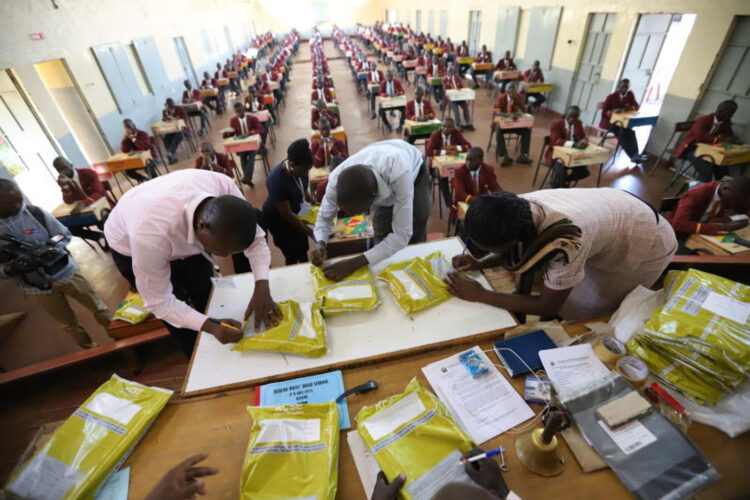Govt to Scrap KNEC, Embrace AI-Powered Exam Marking System in New Proposal.
A sweeping proposal by the government aims to revolutionize the management of national examinations by introducing artificial intelligence (AI) to mark assessments for thousands of learners. The proposal, obtained by Teachersupdates.news, also outlines plans to overhaul existing structures and introduce a new council to align with the Competency-Based Curriculum (CBC) and ongoing educational reforms.
Under the proposed changes, the Kenya National Examinations Council (KNEC) will be dissolved and succeeded by the Kenya National Education Assessments Council (KNEAC). This transition is intended to integrate recent education system adjustments, including the CBC. The draft legislation indicates that the existing council will remain operational for a maximum of two months from the law’s effective date, after which its duties will be transferred to the newly constituted body.
According to the draft Kenya National Education Assessments Council Act, the government plans to employ a variety of exam marking methods. These include traditional pen-and-paper, e-marking, electronic score capture, automated systems such as Automark, optical mark recognition (OMR), and AI-powered assessment tools. The Council will also establish protocols and tools for evaluating both formative and summative assessments, incorporating oral, aural, practical, project-based, and practicum evaluations, among others.
KNEAC will be governed by a council chaired by an appointee of the president as stipulated in Section 24. Membership will include principal secretaries from the ministries of Education and National Treasury, the CEO of the Commission for University Education, and the Director of the Kenya Institute of Curriculum Development.
The Teachers Service Commission Secretary and several other individuals appointed by the Cabinet Secretary—representing stakeholders like persons with disabilities, private education entities, and teacher training institutions—will also form part of the council. Additionally, the Chief Executive Officer of the Council will serve as a member.
Examiners and Assessors
The Council will assign multiple categories of examiners and assessors, such as chief, senior, and deputy chief examiners, team leaders, and general examiners. Where a paper is assessed at two separate centres, an Assistant Chief Examiner or Assessor will be appointed to assist the Deputy Chief Examiner. These appointments will follow the regulatory guidelines outlined in the Council’s Act.
Moreover, KNEAC will establish comprehensive marking and scoring procedures, detailing the duties and roles of each examiner or assessor type. The Council will also oversee the periodic review of these guidelines and ensure continuous evaluation of assessors’ and examiners’ performance for quality assurance.
As per the proposed regulations, individuals requesting confirmation of their examination results will need to submit an application to the Council. This process will be carried out online, following a format to be defined once the Council assumes its functions. Applicants must provide detailed information, including their full name, institution, assessment year and series, assessment name, and learner identification number.
Applicants will also be required to pay a confirmation fee and supply the recipient institution’s complete address. Additionally, they must specify the reason for the request and attach a copy of the original certificate, result slip, or results printout.
Once all necessary documents are submitted, the Council must issue the confirmation statement within ten working days. However, this document will be restricted to use only by the institution it is addressed to and cannot be duplicated or shared with other entities.
For those needing to replace lost certificates, the process will involve providing several supporting documents. These include a certificate copy or verified result printout, a recommendation letter from the head of the exam centre, and an endorsement from the County Director of Education or their representative (for private candidates). A police report confirming the certificate’s loss will also be required.
Read Also: List of TSC and KNEC April Teacher Trainings
Additional documentation includes proof of fee payment, a passport-sized photo, national ID, and for minors, a birth certificate and the parent or guardian’s ID or valid passport. A letter from the registrar of persons verifying the applicant’s identity must also be submitted.
The Chief Executive Officer of the Council will validate and sign the certification document. Provided all requirements are met, the replacement will be ready for collection within fifteen working days and must be picked up in person at the designated Council office.
ICT Infrastructure Requirements for Assessment Centres
With the shift towards tech-based assessments, institutions administering exams must possess adequate ICT infrastructure. This includes computers with high processing power and storage capacity, along with peripherals such as printers and scanners.
Assessment centres will also be required to install and maintain licensed software, secure assessment platforms, and updated operating systems. A stable and reliable internet connection must be ensured for downloading exam materials and uploading completed assessments.
In addition, schools will need to operate a dedicated offline server for processing e-assessments. This server should manage data storage and backups securely and independently of the internet, using robust protocols to safeguard data confidentiality and integrity.
The proposed examination reforms are currently undergoing public participation and review, signaling a transformative shift in Kenya’s education assessment framework.
Govt to Scrap KNEC, Embrace AI-Powered Exam Marking System.



Discussion about this post